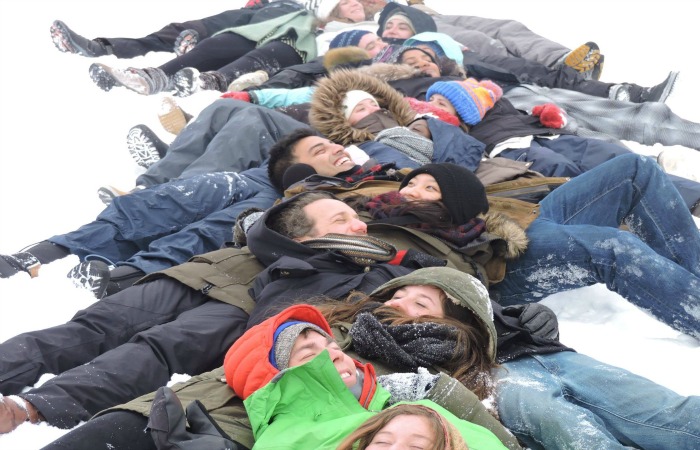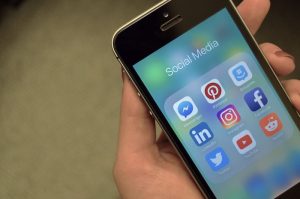The Challenge: Why aren’t we happier, even if we have so much stuff and get so many gifts?
The Science: Science suggests that we’re not spending our resources on the right things.
The Solution: Try these 3 surefire methods to use to “get your happy on” this holiday season!
I grew up in a happy family. We had more than enough of the necessities; we had a number of luxuries; lots of presents were under the Christmas tree every year; we had stylish clothes and new cars every few years, and our college educations were paid for by our parents. As I think back upon those years, however, I cannot even remember the cars that we had; I can’t remember the things under that Christmas tree. What I do remember are the vacations we took to Michigan every year, staying in the same house on a lake. We fished, swam, learned how to water ski, and met up with friends that we had not seen since the summer before. What all of this tells me is that the material objects we had accumulated as a family were not the things that stayed with me and gave me happiness. It was the experiences I had that resulted in such a happy childhood. There is a lesson here for all of us.
Taking a Look at Our Obsessions with “Things”
In ancient times, a man’s life was measured by what he left to his sons when he died. Perhaps that value has come down through the ages and is somehow stuck in our DNA. Today, we all seem to be in some kind of a race to accumulate shiny new objects, whether that is a new home, car, jewelry, clothes, the latest electronics, or even more stunning purchases like a yacht or airplane if we are really rich. Mitt Romney, for example, recently built a mansion in California with an elevator for his cars! We do all of this accumulating while spouting the same old platitudes about happiness – how it comes from within, how it is built by wonderful relationships and good health. And yet, we still pursue happiness by accumulating shiny objects. Why? Well, there is a body of research that has begun to accumulate in a field known as “positive psychology.” While it is by no means as solid as years-long studies of rats on a particular medication, it does give us some insight.
What Science Says About Happiness
Several studies related to happiness do indicate that money is a contributing factor in happiness, but not in the way you might think. What they point to is this: when money is used to purchase experiences rather than things, the sense of happiness from those experiences lasts over a number of years because they are better held in our memories and release “happy chemicals” when we recall them.
Other studies have related to brain activity when we see something new. Subjects were shown a new shiny object – something of value. With the initial viewing, there was a mid-section of the brain that was rather lit up with dopamine, a neurotransmitter that is associated with pleasure. When those same objects were shown again and again, each viewing resulted in less stimulation of that part of the brain, and less dopamine was produced. What this tells us is what we probably already know. When we buy new things, we have an initial sense of great happiness. That sense wanes over time, however, as we become used to having the object. So what do we do? We buy a new object to achieve that sense of happiness again. And at its extreme? People become shopaholics.
Other important research in this area seems to show that we have greater senses of happiness when we are helping others and when we have positive family and social relationships – again, experiences, not things.
So, what is the takeaway from this research? It appears that things give us temporary feelings of happiness but that great experiences are more permanent because recalling them allows that Dopamine to flow all over again.
The Solution – Experiences Trump Things
Of course, we cannot avoid accumulating material things. We need shoes on our feet, a roof over our heads, cars to get to and from, and food on our tables. We also feel that certain things give us conveniences that are important – televisions, computers, cell phones, etc. Just ask any student how s/he would get by without a PC or laptop. But there are a lot of other things that we might want to think about more carefully in terms of what we now know about happiness. Here are 3 methods for making a move to “buying” experiences instead of things.
Ask yourself some key questions as you consider shiny new objects:
- Why am I buying this? Is it to satisfy a real need, or do I just like it?
- What is my motivation for buying this? Am I trying to “up” my status, or am I in some sort of “competition” of accumulation?
- Will I still love this as much 6 months from now as I do right now?
- If I spend money on this, will I be cheating myself of an experience I could have in the near future?
Your answers, if you are honest, should guide your actions. Remember, every dollar spent on a thing is a dollar less for an experience.
Make experiences a priority – both big ones and small ones. You can do this on both a daily basis and long-term basis.
For example:
- Rather than shop during your lunch hour, take your lunch to a park or other green space. You’d be amazed how much fun people-watching can be
- Choose to enjoy a movie, book, or film that brings you pleasure or inspiration. This costs little to nothing.
- Go to the zoo or a museum if you like those kinds of things.
The point is this: you should choose low-cost experiences on a daily basis that you know bring you pleasure.
Make the Bigger Changes
You will be joining a lot of people who have taken major steps to reduce the impact and influence that material goods have had on their lives. They are living more simply; they have given up mind-numbing jobs for ones about which they have some passion; they are focusing on experiences now. Here are a few things you can try:
- Instead of stacking up shiny new objects under that Christmas tree, take a vacation with family or friends.
- Put a savings plan in place to be used only for experiences, not a new car or any other object.




